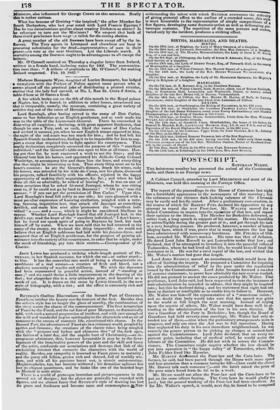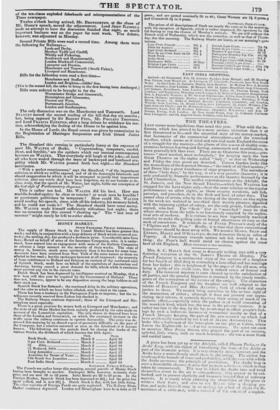The report of the proceedings in the House of Commons
last night has a formidable appearance in the newspapers of this morning ; but the substance of the thirteen dark-looking columns of the Chronicle may be easily and briefly stated. After a preliminary conversation, in the course of which Sir ROBERT PEEL declared his opposition to any attempt to repeal the new Poor-law, Mr. WALTER moved for a Select Committee to inquire into the opesation of that law, and report their opinion to the House. The Member for Berkshire delivered, or rather read, a long speech in support of his motion. Heivaigsinaits inaudible or unintelligible during the greater part of it ; and got through h in a very bungling manner. He produced, however, a number of letters alleging facts, which if true, prove that in many instances the law has been administered with unnecessary harshness. Mr. FIET.DEN of Old- ham, seconded Mr. Walter's motion. His tone was that of defiance. He dared Lord John Russell to put Lancashire under that law ; and declared, that if he attempted to introduce it into the peaceful valley of Todmorden, where he had lived all his life, he would himself head the resistance to it. He was for a total repeal of the law, and wished that Mr. Walter's motion had gone that length.
Lord JOHN RUSSEL!. moved an amendment, which would have the effect of limiting the inquiry. He proposed a Committee for inquiring into the administration of relief to the poor under the regulations issued by the Commissioners. Lord John brought forward a number of counter-statements, to prove how admirably the new system worked. He did not pretend to answer the cases produced by Mr. Walter. That gentleman, Lord John said, had been requested to state the instances of malcadministration he intended to adduce, that they might be inquired into ; but this he declined doing ; and his statement that night had not been so distinct or intelligible as to enable him to follow it. However, Mr. Walter was himself the representative of a "monstrous union;" and no doubt that body would take care that his speech was given to the world at full length the next morning. Instead of relying upon the reports of others, Mr. Walter would have done well in at- tendieg to the administration of the law in his own district. He was a Guardian of the Poor in Berkshire ; but, though the Board of Guardians had held seventy-nine meetings, Mr. Walter had only at- tended ten of them,—nine when the preliminary arrangements were in progress, and only one since the Act was in full operation. Having thus neglected his duty in his own immediate neighbourhood, he was
scarcely the proper person to he picking up charges at second-hand against the Commissioners. Lord John declared, that on every im-
portant point, including that of medical relief, he would assist the labours of the Committee. He did not wish to screen the Commis- sioners. The Committee might inquire whether the law should be put into operation in "the happy valley" of Tormorden, where Mr. John Fielden lived like Rasselas. Mr. HARVEY denflunced the Poor-law and the Corn-laws. The former, he said, had been passed through the House with more speed and less attention than a common turnpike bill—[how could the clever Mr. Harvey talk such nonsense ?]---and the latter raised the price of the poor man's bread from Ss. 6d. to 6s. a week. Mr. HOME would not allow the Poor-law and the Corn-laws to be put on the same odious footing. The Corn.laws he would gladly re. peal ; but the general working of the Poor. law had been excellent. As for Mr. Walter's speech, it would, next day, be found to be composed
of the ten-times exploded falsehoods and misrepresentations of the Times newspaper.
Twelve o'clock having arrived, Mr. BROTHERTON, at the close of Mr. Hume's speech, moved the adjournment. Lord JOHN Pei/sant. made an attempt to have the discussion finished that night, as much important business was on the paper for next week. 'rile debate, however, was adjourned to,Monday.
Several Private Bills were read a second time. Among them were
the following for Railways—
Leeds and Derby, Merthyr Tydfil and Cardiff, Whitby and Pickering, Southwark and Hammersmith, London Blackwell Commercial, Lancaster and Preston, Manchester and Tamworth (South Union), Liverpool and Manchester.
Bills for the following were read a first time—
Manchester and Stafford, London and Brighton—Gibbs' line.
[This is the second bill, the ceder to bring in the first having been discharged.]
Bills were ordered to be brought in for the
Westminster Bridge and Greenwich, Birmingham and Gloucester, Preston and Wyre, Portsmouth Junction, London and Southampton.
The only discussion was on the Manchester and Tamworth. Lord
STANLEY moved the second reading of the bill that day six months ; but, being opposed by Sir ROBERT PEEL, Mr. POULETT 'Tema" and Lord FRANCIS EGERTON, after a long debate he withdrew his mo- tion, acknowledging the feeling of the House to be against him.
In the House of Lords, the Royal assent was given by commission to the Registration of Marriages Suspension and Irish Grand Juries Bills.



























 Previous page
Previous page